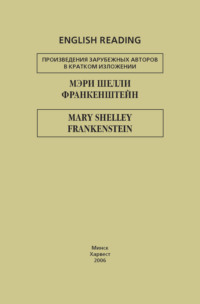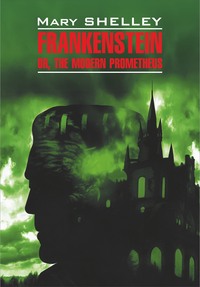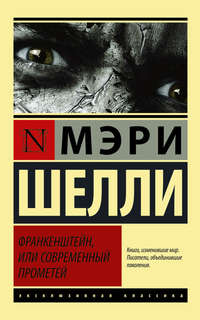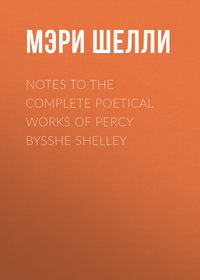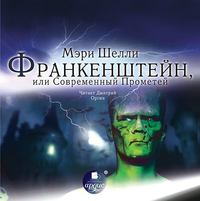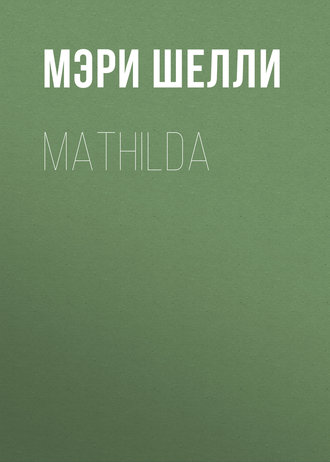 полная версия
полная версияMathilda
A blush spread over the cheek of the lovely girl – Alas, replied she what a tale must I relate what dark & phre[n]zied passions must I unfold – When you Diotima lived on earth your soul seemed to mingle in love only with its own essence & to be unknowing of the various tortures which that heart endures who if it has not sympathized with has been witness of the dreadful struggles of a soul enchained by dark deep passions which were its hell & yet from which it could not escape – Are there in the peaceful language used by the inhabitants of these regions – words burning enough to paint the tortures of the human heart – Can you understand them? or can you in any way sympathize with them – alas though dead I do and my tears flow as when I lived when my memory recalls the dreadful images of the past —
– As the lovely girl spoke my own eyes filled with bitter drops – the spirit of Fantasia seemed to fade from within me and when after placing my hand before my swimming eyes I withdrew it again I found myself under the trees on the banks of the Tiber – The sun was just setting & tinging with crimson the clouds that floated over St. Peters – all was still no human voice was heard – the very air was quiet I rose – & bewildered with the grief that I felt within me the recollection of what I had heard – I hastened to the city that I might see human beings not that I might forget my wandering recollections but that I might impress on my mind what was reality & what was either dream – or at least not of this earth – The Corso of Rome was filled with carriages and as I walked up the Trinita dei' Montes I became disgusted with the crowd that I saw about me & the vacancy & want of beauty not to say deformity of the many beings who meaninglessly buzzed about me – I hastened to my room which overlooked the whole city which as night came on became tranquil – Silent lovely Rome I now gaze on thee – thy domes are illuminated by the moon – and the ghosts of lovely memories float with the night breeze among thy ruins – contemplating thy loveliness which half soothes my miserable heart I record what I have seen – Tomorrow I will again woo Fantasia to lead me to the same walks & invite her to visit me with her visions which I before neglected – Oh let me learn this lesson while yet it may be useful to me that to a mind hopeless & unhappy as mine – a moment of forgetfullness a moment [in] which it can pass out of itself is worth a life of painful recollection.
CHAP. 2
The next morning while sitting on the steps of the temple of Aesculapius in the Borghese gardens Fantasia again visited me & smilingly beckoned to me to follow her – My flight was at first heavy but the breezes commanded by the spirit to convoy me grew stronger as I advanced – a pleasing languour seized my senses & when I recovered I found my self by the Elysian fountain near Diotima – The beautiful female who[m] I had left on the point of narrating her earthly history seemed to have waited for my return and as soon as I appeared she spoke thus —124
1
They are listed in Nitchie, Mary Shelley, Appendix II, pp. 205-208. To them should be added an unfinished and unpublished novel, Cecil, in Lord Abinger's collection.
2
On the basis of the Bodleian notebook and some information about the complete story kindly furnished me by Miss R. Glynn Grylls, I wrote an article, "Mary Shelley's Mathilda, an Unpublished Story and Its Biographical Significance," which appeared in Studies in Philology, XL (1943), 447-462. When the other manuscripts became available, I was able to use them for my book, Mary Shelley, and to draw conclusions more certain and well-founded than the conjectures I had made ten years earlier.
3
A note, probably in Richard Garnett's hand, enclosed in a MS box with the two notebooks in Lord Abinger's collection describes them as of Italian make with "slanting head bands, inserted through the covers." Professor Lewis Patton's list of the contents of the microfilms in the Duke University Library (Library Notes, No. 27, April, 1953) describes them as vellum bound, the back cover of the Mathilda notebook being missing. Lord Abinger's notebooks are on Reel 11. The Bodleian notebook is catalogued as MSS. Shelley d. 1, the Shelley-Rolls fragments as MSS. Shelley adds c. 5.
4
See note 83 to Mathilda, page 89.
5
See Posthumous Works of the Author of a Vindication of the Rights of Woman (4 vols., London, 1798), IV, 97-155.
6
See Maria Gisborne & Edward E. Williams … Their Journals and Letters, ed. by Frederick L. Jones (Norman: University of Oklahoma Press, [1951]), p. 27.
7
See Thomas Medwin, The Life of Percy Bysshe Shelley, revised, with introduction and notes by H. Buxton Forman (London, 1913), p. 252.
8
Journal, pp. 159, 160.
9
Maria Gisborne, etc., pp. 43-44.
10
Letters, I, 182.
11
Ibid., I, 224.
12
See White, Shelley, II, 40-56.
13
See Letters, II, 88, and note 23 to Mathilda.
14
See Shelley and Mary (4 vols. Privately printed [for Sir Percy and Lady Shelley], 1882), II, 338A.
15
See Mrs. Julian Marshall, The Life and Letters of Mary W. Shelley (2 vols. London: Richard Bentley & Son, 1889), I, 255.
16
Julian Works, X, 69.
17
Lives of the Most Eminent Literary and Scientific Men of Italy, Spain, and Portugal (3 vols., Nos. 63, 71, and 96 of the Rev. Dionysius Lardner's Cabinet Cyclopaedia, London, 1835-1837), II, 291-292.
18
The most significant revisions are considered in detail in the notes. The text of the opening of The Fields of Fancy, containing the fanciful framework of the story, later discarded, is printed after the text of Mathilda.
19
The name is spelled thus in the MSS of Mathilda and The Fields of Fancy, though in the printed Journal (taken from Shelley and Mary) and in the Letters it is spelled Matilda. In the MS of the journal, however, it is spelled first Matilda, later Mathilda.
20
Mary has here added detail and contrast to the description in F of F – A, in which the passage "save a few black patches … on the plain ground" does not appear.
21
The addition of "I am alone … withered me" motivates Mathilda's state of mind and her resolve to write her history.
22
Mathilda too is the unwitting victim in a story of incest. Like Oedipus, she has lost her parent-lover by suicide; like him she leaves the scene of the revelation overwhelmed by a sense of her own guilt, "a sacred horror"; like him, she finds a measure of peace as she is about to die.
23
The addition of "the precious memorials … gratitude towards you," by its suggestion of the relationship between Mathilda and Woodville, serves to justify the detailed narration.
24
At this point two sheets have been removed from the notebook. There is no break in continuity, however.
25
The descriptions of Mathilda's father and mother and the account of their marriage in the next few pages are greatly expanded from F of F – A, where there is only one brief paragraph. The process of expansion can be followed in S-R fr and in F of F – B. The development of the character of Diana (who represents Mary's own mother, Mary Wollstonecraft) gave Mary the most trouble. For the identifications with Mary's father and mother, see Nitchie, Mary Shelley, pp. 11, 90-93, 96-97.
26
The passage "There was a gentleman … school & college vacations" is on a slip of paper pasted on page 11 of the MS. In the margin are two fragments, crossed out, evidently parts of what is supplanted by the substituted passage: "an angelic disposition and a quick, penetrating understanding" and "her visits … to … his house were long & frequent & there." In F of F – B Mary wrote of Diana's understanding "that often receives the name of masculine from its firmness and strength." This adjective had often been applied to Mary Wollstonecraft's mind. Mary Shelley's own understanding had been called masculine by Leigh Hunt in 1817 in the Examiner. The word was used also by a reviewer of her last published work, Rambles in Germany and Italy, 1844. (See Nitchie, Mary Shelley, p. 178.)
27
The account of Diana in Mathilda is much better ordered and more coherent than that in F of F – B.
28
The description of the effect of Diana's death on her husband is largely new in Mathilda. F of F – B is frankly incomplete; F of F – A contains some of this material; Mathilda puts it in order and fills in the gaps.
29
This paragraph is an elaboration of the description of her aunt's coldness as found in F of F – B. There is only one sentence in F of F – A.
30
Wordsworth
31
Dante
32
The description of Mathilda's love of nature and of animals is elaborated from both rough drafts. The effect, like that of the preceding addition (see note 11), is to emphasize Mathilda's loneliness. For the theme of loneliness in Mary Shelley's work, see Nitchie, Mary Shelley, pp. 13-17.
33
This paragraph is a revision of F of F – B, which is fragmentary. There is nothing in F of F – A and only one scored-out sentence in S-R fr. None of the rough drafts tells of her plans to join her father.
34
The final paragraph in Chapter II is entirely new.
35
The account of the return of Mathilda's father is very slightly revised from that in F of F – A. F of F – B has only a few fragmentary sentences, scored out. It resumes with the paragraph beginning, "My father was very little changed."
36
Symbolic of Mathilda's subsequent life.
37
Illusion, or the Trances of Nourjahad, a melodrama, was performed at Drury Lane, November 25, 1813. It was anonymous, but it was attributed by some reviewers to Byron, a charge which he indignantly denied. See Byron, Letters and Journals, ed. by Rowland E. Prothero (6 vols. London: Murray, 1902-1904), II, 288.
38
This paragraph is in F of F – B but not in F of F – A. In the margin of the latter, however, is written: "It was not of the tree of knowledge that I ate for no evil followed – it must be of the tree of life that grows close beside it or – ". Perhaps this was intended to go in the preceding paragraph after "My ideas were enlarged by his conversation." Then, when this paragraph was added, the figure, noticeably changed, was included here.
39
Here the MS of F of F – B breaks off to resume only with the meeting of Mathilda and Woodville.
40
At the end of the story (p. 79) Mathilda says, "Death is too terrible an object for the living." Mary was thinking of the deaths of her two children.
41
Mary had read the story of Cupid and Psyche in Apuleius in 1817 and she had made an Italian translation, the MS of which is now in the Library of Congress. See Journal, pp. 79, 85-86.
42
The end of this paragraph gave Mary much trouble. In F of F – A after the words, "my tale must," she develops an elaborate figure: "go with the stream that hurries on – & now was this stream precipitated by an overwhelming fall from the pleasant vallies through which it wandered – down hideous precipieces to a desart black & hopeless – ". This, the original ending of the chapter, was scored out, and a new, simplified version which, with some deletions and changes, became that used in Mathilda was written in the margins of two pages (ff. 57, 58). This revision is a good example of Mary's frequent improvement of her style by the omission of purple patches.
43
In F of F – A there follows a passage which has been scored out and which does not appear in Mathilda: "I have tried in somewhat feeble language to describe the excess of what I may almost call my adoration for my father – you may then in some faint manner imagine my despair when I found that he shunned [me] & that all the little arts I used to re-awaken his lost love made him" – . This is a good example of Mary's frequent revision for the better by the omission of the obvious and expository. But the passage also has intrinsic interest. Mathilda's "adoration" for her father may be compared to Mary's feeling for Godwin. In an unpublished letter (1822) to Jane Williams she wrote, "Until I met Shelley I [could?] justly say that he was my God – and I remember many childish instances of the [ex]cess of attachment I bore for him." See Nitchie, Mary Shelley, p. 89, and note 9.
44
Cf. the account of the services of Fantasia in the opening chapter of F of F – A (see pp. 90-102) together with note 3 to The Fields of Fancy.
45
This passage beginning "Day after day" and closing with the quotation is not in F of F – A, but it is in S-R fr. The quotation is from The Captain by John Fletcher and a collaborator, possibly Massinger. These lines from Act I, Sc. 3 are part of a speech by Lelia addressed to her lover. Later in the play Lelia attempts to seduce her father – possibly a reason for Mary's selection of the lines.
46
Fletcher's comedy of the Captain.
47
At this point (f. 56 of the notebook) begins a long passage, continuing through Chapter V, in which Mary's emotional disturbance in writing about the change in Mathilda's father (representing both Shelley and Godwin?) shows itself on the pages of the MS. They look more like the rough draft than the fair copy. There are numerous slips of the pen, corrections in phrasing and sentence structure, dashes instead of other marks of punctuation, a large blot of ink on f. 57, one major deletion (see note 32).
48
Lord Byron
49
In the margin of F of F – A Mary wrote, "Lord B's Chde Harold." The reference is to stanzas 71 and 72 of Canto IV. Byron compares the rainbow on the cataract first to "Hope upon a death-bed" and finally
Resembling, 'mid the torture of the scene,Love watching Madness with unalterable mien.50
In F of F – A Mathilda "took up Ariosto & read the story of Isabella." Mary's reason for the change is not clear. Perhaps she thought that the fate of Isabella, a tale of love and lust and death (though not of incest), was too close to what was to be Mathilda's fate. She may have felt – and rightly – that the allusions to Lelia and to Myrrha were ample foreshadowings. The reasons for the choice of the seventh canto of Book II of the Faerie Queene may lie in the allegorical meaning of Guyon, or Temperance, and the "dread and horror" of his experience.
51
With this speech, which is not in F of F – A, Mary begins to develop the character of the Steward, who later accompanies Mathilda on her search for her father. Although he is to a very great extent the stereptyped faithful servant, he does serve to dramatize the situation both here and in the later scene.
52
This clause is substituted for a more conventional and less dramatic passage in F of F – A: "& besides there appeared more of struggle than remorse in his manner although sometimes I thought I saw glim[p]ses of the latter feeling in his tumultuous starts & gloomy look."
53
These paragraphs beginning Chapter V are much expanded from F of F – A. Some of the details are in the S-R fr. This scene is recalled at the end of the story. (See page 80) Cf. what Mary says about places that are associated with former emotions in her Rambles in Germany and Italy (2 vols., London: Moxon, 1844), II, 78-79. She is writing of her approach to Venice, where, twenty-five years before, little Clara had died. "It is a strange, but to any person who has suffered, a familiar circumstance, that those who are enduring mental or corporeal agony are strangely alive to immediate external objects, and their imagination even exercises its wild power over them… Thus the banks of the Brenta presented to me a moving scene; not a palace, not a tree of which I did not recognize, as marked and recorded, at a moment when life and death hung upon our speedy arrival at Venice."
54
The remainder of this chapter, which describes the crucial scene between Mathilda and her father, is the result of much revision from F of F – A. Some of the revisions are in S-R fr. In general the text of Mathilda is improved in style. Mary adds concrete, specific words and phrases; e.g., at the end of the first paragraph of Mathilda's speech, the words "of incertitude" appear in Mathilda for the first time. She cancels, even in this final draft, an over-elaborate figure of speech after the words in the father's reply, "implicated in my destruction"; the cancelled passage is too flowery to be appropriate here: "as if when a vulture is carrying off some hare it is struck by an arrow his helpless victim entangled in the same fate is killed by the defeat of its enemy. One word would do all this." Furthermore the revised text shows greater understanding and penetration of the feelings of both speakers: the addition of "Am I the cause of your grief?" which brings out more dramatically what Mathilda has said in the first part of this paragraph; the analysis of the reasons for her presistent questioning; the addition of the final paragraph of her plea, "Alas! Alas!.. you hate me!" which prepares for the father's reply.
55
Almost all the final paragraph of the chapter is added to F of F – A. Three brief S-R fr are much revised and simplified.
56
Decameron, 4th day, 1st story. Mary had read the Decameron in May, 1819. See Journal, p. 121.
57
The passage "I should fear … I must despair" is in S-R fr but not in F of F – A. There, in the margin, is the following: "Is it not the prerogative of superior virtue to pardon the erring and to weigh with mercy their offenses?" This sentence does not appear in Mathilda. Also in the margin of F of F – A is the number (9), the number of the S-R fr.
58
The passage "enough of the world … in unmixed delight" is on a slip pasted over the middle of the page. Some of the obscured text is visible in the margin, heavily scored out. Also in the margin is "Canto IV Vers Ult," referring to the quotation from Dante's Paradiso. This quotation, with the preceding passage beginning "in whose eyes," appears in Mathilda only.
59
The reference to Diana, with the father's rationalization of his love for Mathilda, is in S-R fr but not in F of F – A.
60
In F of F – A this is followed by a series of other gloomy concessive clauses which have been scored out to the advantage of the text.
61
This paragraph has been greatly improved by the omission of elaborate over-statement; e.g., "to pray for mercy & respite from my fear" (F of F – A) becomes merely "to pray."
62
This paragraph about the Steward is added in Mathilda. In F of F – A he is called a servant and his name is Harry. See note 29.
63
This sentence, not in F of F – A, recalls Mathilda's dream.
64
This passage is somewhat more dramatic than that in F of F – A, putting what is there merely a descriptive statement into quotation marks.
65
A stalactite grotto on the island of Antiparos in the Aegean Sea.
66
A good description of Mary's own behavior in England after Shelley's death, of the surface placidity which concealed stormy emotion. See Nitchie, Mary Shelley, pp. 8-10.
67
Job, 17: 15-16, slightly misquoted.
68
The mother of Prince Arthur in Shakespeare's King John. In the MS the words "the little Arthur" are written in pencil above the name of Constance.
69
Coleridge's Fire, Famine and Slaughter.
70
Not in F of F – A. The quotation should read:
Fam. Whisper it, sister! so and so!
In a dark hint, soft and slow.
71
In F of F – A this account of her plans is addressed to Diotima, and Mathilda's excuse for not detailing them is that they are too trivial to interest spirits no longer on earth; this is the only intrusion of the framework into Mathilda's narrative in The Fields of Fancy. Mathilda's refusal to recount her stratagems, though the omission is a welcome one to the reader, may represent the flagging of Mary's invention. Similarly in Frankenstein she offers excuses for not explaining how the Monster was brought to life. The entire passage, "Alas! I even now … remain unfinished. I was," is on a slip of paper pasted on the page.
72
The comparison to a Hermitess and the wearing of the "fanciful nunlike dress" are appropriate though melodramatic. They appear only in Mathilda. Mathilda refers to her "whimsical nunlike habit" again after she meets Woodville (see page 60) and tells us in a deleted passage that it was "a close nunlike gown of black silk."
73
Cf. Shelley, Prometheus Unbound, I, 48: "the wingless, crawling hours." This phrase ("my part in submitting … minutes") and the remainder of the paragraph are an elaboration of the simple phrase in F of F – A, "my part in enduring it – ," with its ambiguous pronoun. The last page of Chapter VIII shows many corrections, even in the MS of Mathilda. It is another passage that Mary seems to have written in some agitation of spirit. Cf. note 26.
74
In F of F – A there are several false starts before this sentence. The name there is Welford; on the next page it becomes Lovel, which is thereafter used throughout The Fields of Fancy and appears twice, probably inadvertently, in Mathilda, where it is crossed out. In a few of the S-R fr it is Herbert. In Mathilda it is at first Herbert, which is used until after the rewritten conclusion (see note 83) but is corrected throughout to Woodville. On the final pages Woodville alone is used. (It is interesting, though not particularly significant, that one of the minor characters in Lamb's John Woodvil is named Lovel. Such mellifluous names rolled easily from the pens of all the romantic writers.) This, her first portrait of Shelley in fiction, gave Mary considerable trouble: revisions from the rough drafts are numerous. The passage on Woodville's endowment by fortune, for example, is much more concise and effective than that in S-R fr. Also Mary curbed somewhat the extravagance of her praise of Woodville, omitting such hyperboles as "When he appeared a new sun seemed to rise on the day & he had all the benignity of the dispensor of light," and "he seemed to come as the God of the world."




